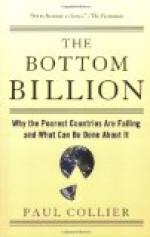Berton Braley.
From “Things As They Are.”
PLAY THE GAME
The Duke of Wellington said that the battle of Waterloo was won on the cricket fields of Eton. English sport at its best is admirable; it asks outward triumph if possible, but far more it asks that one do his best till the very end and treat his opponent with courtesy and fairness. The spirit thus instilled at school has again and again been carried in after life into the large affairs of the nation.
There’s a breathless hush in the
Close to-night—
Ten to make and the match
to win—
A bumping pitch and a blinding light,
An hour to play and the last
man in.
And it’s not for the sake of a ribboned
coat
Or the selfish hope of a season’s
fame,
But his Captain’s hand on his shoulder
smote;
“Play up! Play
up! And play the game!”
The sand of the desert is sodden red—
Red with the wreck of a square
that broke;
The Gatling’s jammed and the colonel
dead,
And the regiment’s blind
with dust and smoke.
The river of death has brimmed his banks,
And England’s far and
Honor a name,
But the voice of a schoolboy rallies the
ranks,
“Play up! Play
up! And play the game!”
This is the word that year by year,
While in her place the School
is set,
Every one of her sons must hear,
And none that hears it dare
forget.
This they all with a joyful mind
Bear through life like a torch
in flame,
And falling, fling to the host behind—
“Play up! Play
up! And play the game!”
Henry Newbolt.
From “Admirals All, and Other Verses.”
THE MAN WHO FRETS AT WORLDLY STRIFE
“Lord, what fools these mortals be!” exclaims Puck in A Mid-summer Night’s Dream. And well might the fairy marvel who sees folk vexing themselves over matters that nine times out of ten come to nothing. Much wiser is the man who smiles at misfortunes, even when they are real ones and affect him personally. Charles Lamb once cheerfully helped to hiss off the stage a play he himself had written.
The man who frets at worldly strife
Grows sallow, sour, and thin;
Give us the lad whose happy life
Is one perpetual grin:
He, Midas-like, turns all to gold—
He smiles when others sigh,
Enjoys alike the hot and cold,
And laughs though wet or dry.
There’s fun in everything we meet,—
The greatest, worst, and best;
Existence is a merry treat,
And every speech a jest:
* * * * *
So, come what may, the man’s in
luck
Who turns it all to glee,
And laughing, cries, with honest Puck,
“Good Lord! what fools
ye be.”




